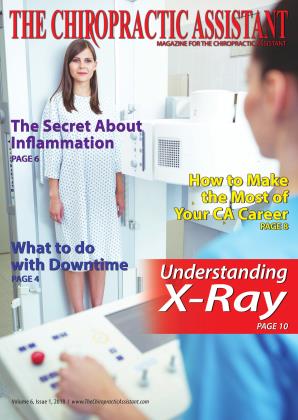What Do You Do During Downtime?
Nancy Singleton
It's always exciting when the office is wonderfully chaotic and busy—patients seem to be everywhere and you happily struggle to keep up with all that needs to be done in those moments. Patients are coming and going, staff members are busy servicing patients, synergy is in the air, and things seem to be going well.
There will always be those times in the office.
However, in all offices, there will also be periods of downtime when you may be tempted to kick back, relax, and perhaps feel that a break is well deserved.
In order for a business to be as successful as possible, though, what you choose to do when the office isn't busy is just as important as what you do when it is busy. There may be times around holidays when the practice isn't seeing too many patients, or there may be days when the weather keeps patients away. Sometimes there may be a streak of cancellations and the office just isn't as busy as you'd hoped. When such times arise, take the opportunity to implement some of the following suggestions:
• Call patients who may not have shown up or who you weren't able to reach earlier. Reach outto past patients and follow up on new leads.
• Pull files for patients who haven't been seen in a while. Call them to say that you would like to make sure you have their correct mailing and e-mail addresses so that you can send them a special offer (and then do it).
• Pull a group of files for patients who haven't been in for a while and ask for approval from your doctor to call them. Call these patients and say, "The doctor asked me to call and let you know [he or she] has been thinking about you and would like to hear how you are doing." You'll be surprised to hear many of them say, "I've been thinking about making another appointment. I'm glad you called." This activity will get some appointments scheduled.
• Find patients with upcoming birthdays, have
“Pull files for patients who haven't been seen in a while. ”
the office staff sign birthday cards, and then send them out. Consider including a special offer or incentive for referrals.
Deep clean. Even when you use a cleaning service, they may not get the spots that are hard to see, and besides that, the office will get dirty between their visits. Look around closely and see what needs to be done. Pay particular attention to the garbage, bathrooms, and fingerprints left on doors, windows, or countertops. Make sure the office has a pleasant smell.
• Lie on the patients' equipment and see things from their perspective. Is it comfortable? Does it look clean from where they are positioned? How can it be more appealing?
• Organize paperwork and files. This can be a daunting task in some offices, but getting it done once will make life easierfor a longtime to come. Some forms may need to be updated, so make sure all of your forms have the information needed.
• Work on a newsletter to send to patients regularly.
“just because the office isn't busy, it doesn't mean that it's time to relax and take a break. ”
• Appropriately place promotions on the walls or other display places, such as ads for the office, advertisements for classes in the practice, or specials offered for new patients, regular patients, or referrals.
• Make sure you have an agenda for the next staff meeting and a list of things to address, whether positive or constructive criticism.
• Create a box in the office where all staff members can drop in "nice notes" about each other. Have slips of paper next to it that say, "Something nice
about_." Write the great things you
see other staff members do, the doctor do, or patients do, and then read those notes during weekly the next staff meeting. This is a great way to keep things positive by always looking for the best in others.
• Make your own list of tasks that need to be accomplished. Get input from everyone.
Just because the office isn't busy, it doesn't mean that it's time to relax and take a break. Remember that you're being paid to be there and to better the practice, even when there aren't patients to help. Every member of the staff is responsible for the success of the business, and doing your part will increase productivity and patient retention, as well as enhance the overall atmosphere of the practice. Keep it in order, keep it clean, and keep it positive. We all want to work in a place that is constructive and confidently successful, so do your part to make it that way.
Nancy Singleton is a 1989 graduate of the Los Angeles College of Chiropractic Assistants. She has been consulting and helping doctors grow their practices for more than 25 years. She and her husband' Dr. Todd Singleton, teach chiropractors how to implement multiple cash systems into their existing practices. For more information, call 801-917-0900, e-mail [email protected], or visit www.ArticlesByNancySingleton.com.
 View Full Issue
View Full Issue
